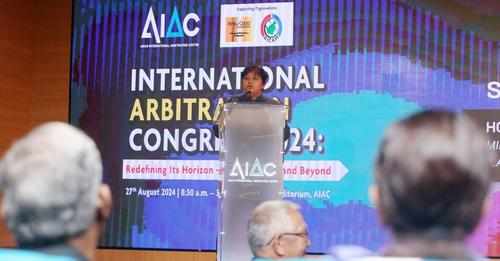Spearheading Malaysia’s Advancement International Commercial
ON my recent working visit to Hong Kong, I had the privilege of engaging with business leaders, legal experts, and chambers of commerce from across the region.
These conversations remarked an essential shift: the global centre of gravity for legal and commercial services are moving eastwards, with the wider Asia region growing as a dynamic hub of trade and commerce, as well as the geographical advantage Malaysia has, to emerge as among the global leaders in commercial arbitration.
Indeed, as Asia’s economic influence continues to expand, with unprecedented growth in trade and investment, arbitration is increasingly favoured for its flexibility, efficiency, and confidentiality.
In Hong Kong, I highlighted Malaysia’s credentials and ambition to emulate the success of the legal sector in Hong Kong.

We have a longstanding commitment to the rule of law, robust legal institutions, a diverse pool of highly-trained legal professionals, and the Asian International Arbitration Centre (Malaysia) (AIAC) – which offers a cost effective, neutral, and geographically strategic venue for arbitration, embedded in the Asean economic community.
Promoting the AIAC as a preferred arbitral institution, both within the Asia Pacific region and across the world, was a key focus of my visit.
The AIAC has already established itself as a leading institution for dispute resolution and certainly, the institutional reforms kicked-off early this year will usher a new phase for the AIAC and spur sustainable growth of the Centre globally.
The rebranding of the Kuala Lumpur Regional Centre for Arbitration (KLRCA) to the AIAC in 2018, which occurred during my previous tenure as Minister, marked a pivotal milestone.
This transformation was not just a change in name; it represents a broader institutional reform that is being implemented today and a strategic initiative, including establishing the inaugural AIAC Court of Arbitration, that underscores Malaysia’s growing influence and our unwavering commitment to becoming a leader in international arbitration.
With this perspective in mind, our work to solidify Malaysia’s stature an arbitration hub of choice has been long underway.
The recent formalisation of the Supplementary Agreement with Asian-African Legal Consultative Organization (AALCO) represents the testament of the Malaysian Government and AALCO for continuous improvement of the institutional framework of the AIAC as well as strengthening a good governance system that upholds transparency, integrity and effective checks and balances to further elevate AIAC’s standing on par with other leading international arbitral institutions globally.
Our commitment to AALCO is exemplified through strengthening our network with the sister AALCO arbitration centres in Egypt, Nigeria, Iran, Kenya and Hong Kong SAR.
It is my hope that AALCO regional centres continue to foster stronger relationships, promoting and supporting one another, and ultimately championing the voices of the Asian-African regions in the global stage.
I am confident that by leveraging each other’s strengths, we can create a synergy that enriches the global alternative dispute resolution (ADR) community as a whole.
Along with this, the Government’s latest legislative effort in streamlining the Arbitration Act 2005, which among others introduced Third Party Funding (TPF), was driven by the overarching goal of enhancing Malaysia’s attractiveness as an ADR hub, whilst regulating an access-to-justice tool that is regrettably too often abused.
We have learned the importance of regulating TPF with our experience with the Sulu case, which revealed the risks associated with unregulated TPF in legal disputes.
The alleged Sulu heirs are in fact backed by a London-based litigation funder, Therium, bankrolling millions of dollars in this baseless claim in the hope for a payday at Malaysia’s expenses.
These abuses can no longer be tolerated. By implementing a transparent and robust TPF regulatory framework, Malaysia is not just mitigating risk, it is boosting the credibility of international arbitration beyond a mere ADR mechanism.
Beyond TPF and its regulation, more comprehensive reforms are required. Our commercial laws must be streamlined to keep pace with global commerce, and my team and the Legal Affairs Division are committed to pursuing this broader effort, working hand-in-hand with professional associations, academia, and regional partners, to ensure our laws reflect the realities of modern trade and dispute resolution.
Concurrently, we are also actively promoting mediation as an effective means of ADR that offers an amicable and more cost-effective method for parties to reach meaningful settlements.
After Hong Kong, my outreach efforts will continue in the next few weeks, with scheduled visits to China and India to further promote Malaysia’s ADR capabilities.
These engagements and the upcoming outreach will guide our strategic initiatives, allowing us to position Malaysia and the AIAC as a respected and innovative ground in the international arbitration community.
I am also excited to attend key events such as the AIAC’s Asia ADR Week 2024, and the Great Wall of Alliance’s Forum on International Commercial Arbitration and Dispute Resolution.
These platforms will offer invaluable opportunities to foster indispensable collaboration with our partners regionally and globally.
In September, we will welcome the Secretary of Justice from Hong Kong for a reciprocal visit to Kuala Lumpur. I look forward to continuing the conversations in Hong Kong, strengthening the ties between our legal institutions, and exploring new avenues for cooperation.
A recurring theme of my engagements has been artificial intelligence (AI) and the potential it has to revolutionise dispute resolution. Malaysia is keen to exploring the integration of AI into legal innovations that will solidify the region’s endeavour to champion this development.
Dispute resolution is our present, and our future. By advancing our legal frameworks, promoting the AIAC, and embracing innovation, we are laying the groundwork for Malaysia to thrive as a regional and global leader in dispute resolution, providing highly skilled jobs for the next generation of Malaysians and attracting international investment.
I am honoured to be leading this change, within our borders and beyond.
DATUK SERI AZALINA OTHMAN SAID
The writer is Minister of Law and Institutional Reform, Malaysia
